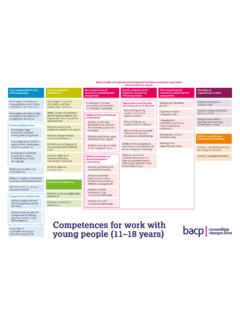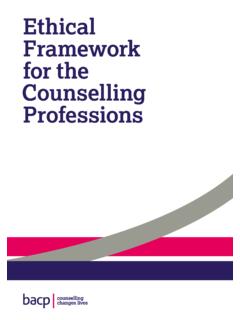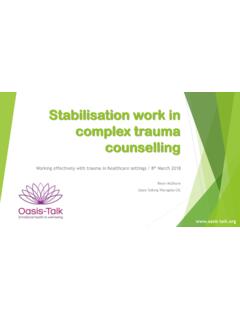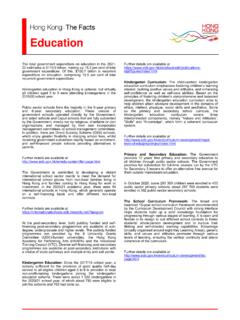Transcription of BACP Competences Working in Further Higher Education ...
1 Counsellors GuideTHE Competences REQUIRED TO DELIVER EFFECTIVE COUNSELLING IN Further AND Higher Education THE Competences REQUIRED TO DELIVER EFFECTIVE COUNSELLING IN Further AND Higher Education BACP 2016i BACP 2016 THE Competences REQUIRED TO DELIVER EFFECTIVE COUNSELLING IN Further AND Higher EDUCATIONThe full listing of Competences for counselling in Further and Higher Education at GuideTHE Competences REQUIRED TO DELIVER EFFECTIVE COUNSELLING IN Further AND Higher Education iiTHE Competences REQUIRED TO DELIVER EFFECTIVE COUNSELLING IN Further AND Higher Education BACP 2016 BACP 2016 THE Competences REQUIRED TO DELIVER EFFECTIVE COUNSELLING IN Further AND Higher EDUCATIONE xecutive summary 1 Acknowledgements 1A note on terminology counselling in FE/HE 1 Who can apply the competence framework? 1 The Competences required to deliver effective counselling in FE/HE 2 How to use this report 2 Background 2 How the Competences were identified 2 Scope of the work 2 The competence model for counselling in FE/HE 3 Organising the competence lists 3 Knowledge relevant to Working in the FE/HE context 3 Working in the organisational context 3 Assessment in the FE/HE context 3 Areas of application 3 Metacompetences 3 Specifying the Competences needed to deliver counselling in FE/HE 5 Integrating knowledge.
2 Skills and attitudes 5 The map of Competences for counselling in FE/HE 5 Using the map 5 Layout of the competence lists 5 Generic therapeutic Competences 7 Knowledge and understanding of mental health problems 7 Knowledge of, and ability to operate within, professional and ethical guidelines 7 Knowledge of a model of therapy, and the ability to understand and employ the model in practice 7 Ability to engage the client 7 Ability to foster and maintain a good therapeutic alliance, and to grasp the client s perspective and world view 7 Ability to work with emotional content 7 Ability to manage endings 7 Ability to undertake a generic assessment (relevant history and identifying suitability for intervention) 7 Ability to make use of supervision 8 Ability to work with difference (cultural competence) 8 Ability to use measures to guide therapy and to monitor outcomes 8 ContentsiiiTHE Competences REQUIRED TO DELIVER EFFECTIVE COUNSELLING IN Further AND Higher Education BACP 2016 BACP 2016 THE Competences REQUIRED TO DELIVER EFFECTIVE COUNSELLING IN Further AND Higher EDUCATIONA ssessment in the FE/HE context 8 Ability to conduct a collaborative assessment 8 Ability to conduct a risk assessment 9 Knowledge relevant to Working in the FE/HE context 9 Knowledge of relevant legal frameworks and procedures 9 The implications of student psychosocial development for Working in the FE/HE context 9 Knowledge of student populations and their experience of the FE/HE context 9 Working in the organisational context 10 Working in the FE/HE organisational context 10 Ability to offer training and consultancy aimed at enhancing emotional wellbeing across the organisation
3 11 Areas of application 11 Establishing and instituting time-limited interventions 11 Ability to work with groups 11 Working with transitions relating to entering, progressing and completing a programme of study 12 Working with stress in the FE/HE context 12 Working with interpersonal issues arising in the FE/HE context 12 Working with psychosexual development and sexual relationships 13 Metacompetences for counselling in FE/HE 13 Implementing the competence framework 14 Therapeutic modalities 14 The impact of the organisational setting on clinical effectiveness 14 Applying the competence framework 15 Concluding comments 15 About the authors 16 References 16 Appendix A Membership of the ERG 16 Appendix B List of sources 16 Manuals and texts 1601 THE Competences REQUIRED TO DELIVER EFFECTIVE COUNSELLING IN Further AND Higher Education BACK TO CONTENTS BACK TO CONTENTS THE Competences REQUIRED TO DELIVER EFFECTIVE COUNSELLING IN Further AND Higher EDUCATIONE xecutive summaryThis document identifies the activities associated with the delivery of
4 Effective counselling in Further and Higher Education (FE/HE) and the Competences required to achieve these. It describes a model of the relevant Competences , and discusses how this should be applied by practitioners, its advantages for counsellors, service managers and trainers, and how it can be used. It is applicable to Working in universities and colleges with students of all backgrounds and age Competences are organised into five domains, as follows:n The first domain covers Competences that should be demonstrated by all counsellors regardless of their work settings. These describe the Competences required for managing sessions and any form of counselling The second domain covers the underpinning knowledge necessary for the delivery of counselling in FE/HE contexts. n The third describes knowledge and skills needed to operate effectively in the FE/HE organisational context, including therapeutic knowledge and abilities, and the ability to conduct assessments in this The fourth describes the application of interventions with an emphasis on the skills and knowledge necessary to provide therapeutic interventions to students in FE/HE.
5 N The fifth domain identifies meta- Competences overarching, Higher -order Competences which counsellors need to use to guide the implementation of any assessment or report then describes and comments on the type of Competences found in each domain, and maps them to show how they fit together and inter-relate. Finally it addresses issues that are relevant to the implementation of the competence framework, and considers some of the organisational issues around its application. Acknowledgements This report was commissioned by the British Association for Counselling and Psychotherapy (BACP). The project team was headed by Andrew Hill, and the Expert Reference Group (ERG)1 was chaired by Helen Coles. Professor Tony Roth acted as Advisor to the project team. The ERG comprised: Alison Brettle, Ruth Caleb, Helen Coles, Vicky Groves, Dawn Hastings, Andy Hill, Ronnie Millar, Tony Roth, Susan Steging, Patti Wallace and Mel Brettle (University of Salford) conducted the literature review that underpins the competence framework.
6 We are also grateful to colleagues on the BACP UC Executive for their valued contribution. A note on terminology counselling in FE/HE The term counselling is used generically in this framework and does not specify a particular modality or theoretical approach. It is assumed that all counsellors Working in FE/HE would use these Competences , regardless of theoretical approach. Who can apply the competence framework? Competence frameworks describe what a counsellor might do; they do not identify who can implement them. The standards set by the framework can be met by counsellors with a range of professional backgrounds, on the basis that they have received a training which equips them to carry out the counselling competently. The issue of competence and of relevant training is the critical factor, rather than the title of the person offering the therapy. Although many practitioners will use the professional title of counsellor some may be denoted as psychotherapists.
7 The distinction in title reflects a mix of factors, such as the theoretical orientation and the type of core professional training undertaken. Counsellors and psychotherapists could offer the Competences embodied in this framework, with the appropriate level of training. 1 Appendix A shows the professional affiliations of members of the ERG02 THE Competences REQUIRED TO DELIVER EFFECTIVE COUNSELLING IN Further AND Higher Education BACK TO CONTENTS BACK TO CONTENTS THE Competences REQUIRED TO DELIVER EFFECTIVE COUNSELLING IN Further AND Higher EDUCATIONThe Competences required to deliver effective counselling in FE/HEHow to use this reportThis report describes the model of Competences for counselling in FE/HE and indicates the various areas of activity, which together, represent good clinical practice. This report does not include detailed descriptions of the Competences associated with each of these activities: these can be downloaded from They are available as pdf files, which can be accessed directly or by navigating the map of Competences (shown in Figure 2).
8 BackgroundHow the Competences were identifiedOversight and peer-review: The work described in this report was overseen by an Expert Reference Group (ERG) with specific expertise in counselling in FE/HE. Although nearly all were members of BACP, membership of a professional organisation was considered a secondary concern, since the framework aims to set out clinical practice rather than to describe professional affiliations. Tony Roth acted as an external consultant to the ERG in order to provide consistency with previously published competence ERG helped to identify the trials, manuals and basic texts most relevant to counselling in FE/HE, ensured that the process of extracting Competences was appropriate and systematic, and contributed directly to the process of open peer-review while subjecting the competence lists to an appropriate level of scrutiny. Identifying Competences : The initial aim in developing the FE/HE framework was broadly to follow the methodology for identifying Competences developed at University college London2.
9 This approach starts by interrogating research studies to identify interventions with a stong evidence base provided by clinical control trials. Alison Brettle was commissioned to undertake a systematic review of evidence for counselling in FE/HE. In relation to the criteria we applied, it seems that the evidence base for the efficacy of counselling in FE/HE is not extensive, and so the identification of Competences drew extensively upon the opinion of the ERG. No specific counselling approach has a substantive evidence of efficacy. Therefore the framework does not attempt to detail specific models of counselling in FE/HE but instead focuses on the knowledge, attitudes and skills needed to work effectively in this setting, based upon broad evidence for efficacy, and/or strong professional consensus regarding their importance and value. 2 A detailed account of this methodology can be found in Roth and Pilling (2008).
10 Although this paper focuses on the development of the CBT framework the methodological issues it raises are relevant to the present framework. Selection of source materials Literature searches discovered very few therapy manuals. Descriptions of FE/HE counselling are mostly available in textbooks which combine statements of theory with specific practice. The ERG identified a series of core texts, which were representative of counselling in FE/HE (for example those used on courses (listed in Appendix B). Scope of the workA focus on the FE/HE context The competence framework focuses on the knowledge, attitudes and skills needed to work effectively in FE/HE organisations. It is intended to be applicable to therapists Working from any theoretical base and in all modalities. The nature of counselling in FE/HE Counselling in FE/HE is characterised by the need to work briefly and strategically within the constraints of semesters and the academic cycle, so has a tendency to be pragmatic and contextual.)










